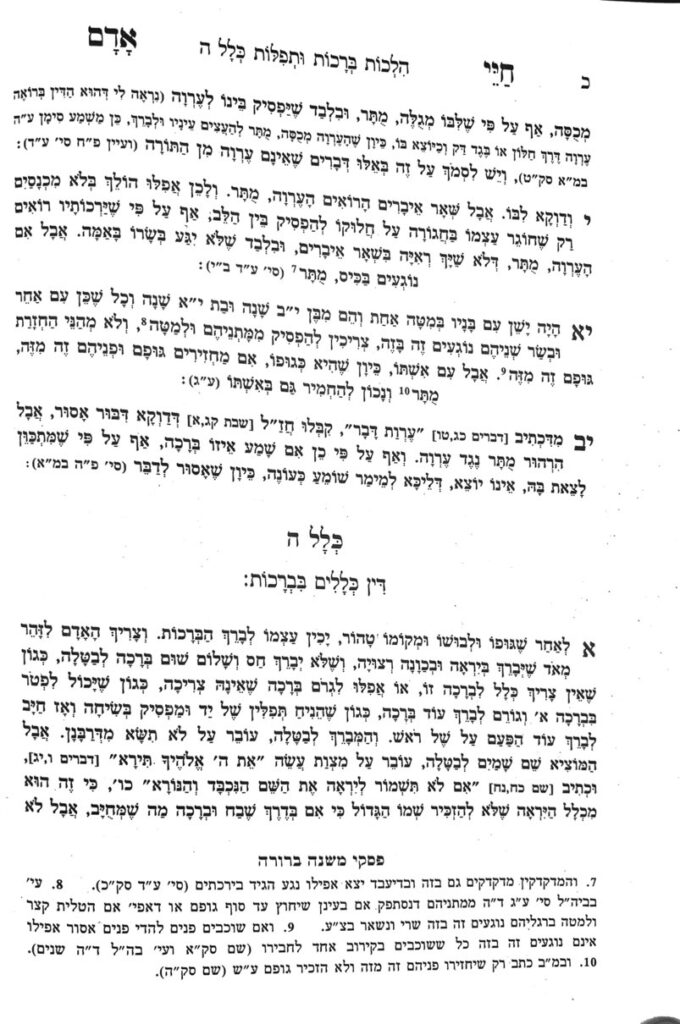We are continuing in siman 12, discussing the opinion of the Chayei Adam that one can listen to words of torah while in the presence of ervah, but cannot fulfill any obligations which would require shomeah k’oneh.
The source for the Chayei Adam is the Magen Avraham in siman 85. However, the Shulchan Aruch Harav, in siman 75, points out that the Taz and Shach in Yoreh Deah disagree. They hold that any time one is listening to another individual, even if they are not trying to fulfill any obligation, it is still considered shomeah k’oneh and is assur to listen in the presence of ervah. Thus, in the example we gave in the previous shiur of two people, one who is facing ervah and one who is not, although the person not facing the ervah can learn on their own, they cannot speak words of torah to the person who is facing ervah.
This machlokes hinges on the question of how shomeah k’oneh works: does shomeah k’oneh only work when one has kavanah to fulfill an obligation, or even when they do not have any obligation to fulfill?
The Gemara in Sukkah learns the source of shomeah k’oneh from a story. The Gemara tells us that Menashe would take sifrei torah and replace all of the names of Hashem with names of avodah zarah. The Kohanim took the sefer torah used in the Beis Hamikdash, which was written by Moshe Rabbeinu, and hid it away, so that Menashe would not be able to desecrate it. In the time King Yoshiyahu, the kohanim found this sefer torah, and when they opened it, they saw it was rolled to the tochacha. They read it to Yoshiyahu. the pasuk then says “they took the sefer torah which Yoshiyahu read [etc]”, ascribing the reading to Yoshiyahu, even though he did not read it , but just listened to it.
This reading was not a mitzvah of kriyas hatorah, but simply informing Yoshiyahu of what the sefer torah said and to where it was rolled. Yoshiyahu was clearly not trying to be yotzei any mitzvah, yet the pasuk describes that Yoshiyahu read from it himself.
The Gemara learns the concept of shomeah k’oneh from this story, even though Yoshiyahu was not trying to fulfill any obligation. Thus, we see that shomeah k’oneh is not limited to situations in which one wishes to fulfill a mitzvah, but rather to any time that two people are speaking. The speech is shared between the person who is speaking and the person who is listening.
To explain this, there is a famous philosophical question of whether a tree which falls in a forest where no one is present, makes a sound. Although Rabbi Reingold does not know the answer to that question, we certainly see that speech, dibbur, spoken without someone listening is not considered speech, i.e., dibbur means communication. Communication requires a speaker and a listener. When one speaks out loud, they serve as both the speaker and listener, and when one speaks to someone else, they are the listener and both are credited with the speech, dibbur.
If so, according to the Taz, Shach and Prisha, there is no heter to hear words of torah while in the presence of ervah, even when one is not trying to be yotzei an obligation.
Summary
- It is muttar to think in learning in the presence of ervah.
- The Chayei Adam holds it is muttar to hear another person speak in learning, but assur to be yotzei any obligations which require shomeah k’oneh. The Shach and Taz hold it is assur to hear another person speak in learning as well.



